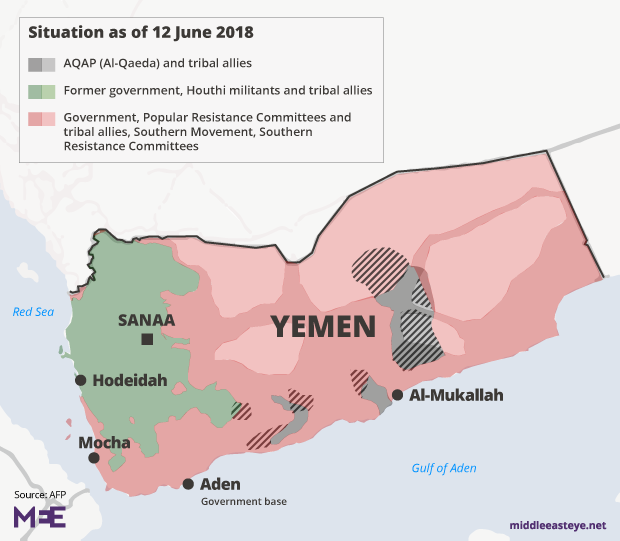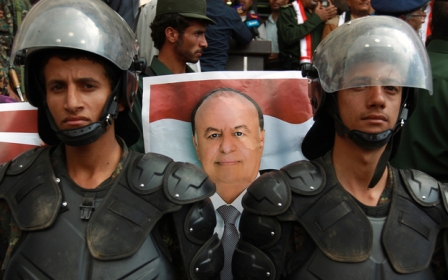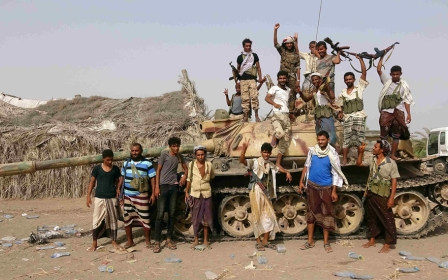Dozens dead as Hodeidah offensive enters its second day

Air strikes by a Saudi-led coalition targeted areas around Yemen's rebel-held port city of Hodeidah on Thursday, the rebels said, as an offensive to take the vital aid gateway entered its second day.
Warplanes and battleships belonging to the Saudi-led coalition backing the forces of Yemen's internationally recognised government began an offensive aimed at taking Hodeidah from the Houthis on Wednesday, pressing toward the airport south of the city. At least 39 combatants have been killed so far.
Yemen's government forces backed by the Saudi-led coalition are holding off, for now, on advancing on the rebel-held port of Hodeidah, Yemen's foreign minister said on Thursday.
"We are not coming close to the sea port," Khaled Alyemany told reporters during a press conference at the UN mission of the United Arab Emirates.
"We are in an area close to the airport, but not to the sea port. The sea port is totally out of operations, today," he insisted.
The coalition offensive came as Middle East Eye received exclusive information alleging that the UAE had forced Yemen’s President Abd Rabbuh Mansour Hadi to announce his support for the Emirati-backed assault against his will.
Hadi was reportedly set to arrive in the southwestern Yemeni city of Aden, which is ostensibly the seat of his government but is currently controlled by the Emiratis, on Thursday.
According to MEE’s source, the move, while effectively sidelining the leader of the internationally recognised government, also means that Hodeidah runs the risk of becoming another city totally controlled by the UAE rather than the Yemeni state.
Yemen's Houthi rebels have suffered 30 fatalities in the fighting, which took place two kilometres from Hodeidah airport, south of the city, medical sources told AFP.
Nine pro-government troops were killed in the same area, the medics said. Military sources said the deaths were caused by mines and snipers.
Saudi-led coalition warplanes and Apache helicopters provided "continuous" air support to ground forces, striking Houthi positions, military sources said on Thursday.
The Houthis have put up a fierce resistance, however, using snipers to slow the assault, the sources added.
On shore, the offensive has reached the outskirts of Hodeidah airport.
Coalition spokesman Turki al-Malki has said operation "Golden Victory" aimed to wrest control of the port and airport, but that troops would avoid entering the city.A Yemeni anti-Houthi military official said the 21,000-strong ground force - which includes Emiratis, Sudanese and Yemenis from several factions - was demining the coastal strip south of Hodeidah and combing rural areas for Houthi fighters.
Saudi-owned al-Arabiya TV reported that a Houthi missile was intercepted over the city of Khamis Mushait in southern Saudi Arabia. However, according to Houthi-run al-Masirah television it hit an air base.
‘There is no escape’
Two residents contacted by Reuters said Apache attack helicopters were conducting intensive strikes on a strip of coastal territory near the airport.
"People are scared. The warships are terrifying and warplanes are flying overhead all the time," university student Amina, 22, who lives near the port, told Reuters by telephone.
"People are fleeing the city to the countryside, but for those with no relatives there or money, there is no escape."
The Gulf-led coalition also struck the main road linking Hodeidah - home to 600,000 people - to the capital Sanaa to block reinforcements, residents and anti-Houthi Yemeni military officials said.
"There is an atmosphere of danger and intense fear in these areas where the coalition are clearing out enemy combatants, especially the areas of al-Shajayra and Nakhayla," Bassim al-Jenani, a Yemeni journalist from Hodeidah currently based in Egypt, told MEE on Wednesday. "The people are still in their homes and people can’t leave the Durayhimi district centre. The atmosphere is one of terror."
The offensive is controversial because the port serves as the entry point for 70 to 80 percent of Yemen's imports, as the country teeters on the brink of famine.
On Thursday, authorities at the port said it remained open to ships.
Two Saudi and UAE aid ships were in the waters off Hodeidah, coalition spokesman Maliki told Saudi state media.
The United Nations is struggling to avert disruption to the port, the main lifeline for food aid to a country where 8.4 million people are on the verge of starvation, potentially the world's worst famine for decades.
The International Committee of the Red Cross said any battle for Hodeidah would exacerbate the suffering of the population.
"Life-saving items cannot be given to those in need while fighting is ongoing," ICRC Middle East director Robert Mardini said in a statement.
The UN children's fund, UNICEF, has raised alarm over the plight of Hodeidah's 300,000 children and the risk that drinking water supplies will be disrupted.
The United Nations says 22 million Yemenis need humanitarian aid, and the number at risk of starvation could more than double to more than 18 million by year-end unless access improves.
The world body said it was still bringing aid. "We are there and delivering, we are not leaving Hodeidah," UN humanitarian coordinator for Yemen, Lise Grande, said.
Saudi Arabia and the UAE say they have plans in place to prevent the battle from causing a humanitarian disaster. They have long been restricting imports into Hodeidah to prevent what they say is Iranian traffic of missiles to the Houthis, and say they can swiftly improve food supplies once they control the port.
‘Catastrophic consequences’
Capturing Hodeidah would give the coalition a major boost in the war.
The UN Security Council is due to meet behind closed doors on Thursday, at the request of Britain, over the offensive. The UN special envoy to Yemen, Martin Griffiths, has said the world body is talking to both sides to de-escalate.
Houthi leader Mohammed Ali al-Houthi has blamed the West for the assault. "The British told us a week ago that the Emiratis and the Saudis had told them they would not enter the battle of Hodeidah without their agreement and assistance," he said.
Foreign Secretary Boris Johnson said on Wednesday the British government was in contact with the alliance about ensuring its operations comply with international law on protecting civilians.
Russia warned on Thursday that the Hodeidah offensive could lead to “catastrophic” results for the entire war-ravaged country.
"The offensive against Hodeidah risks triggering catastrophic consequences for all of Yemen," Russia's foreign ministry said in a statement.
"They will face a frightening choice - either to get killed in bombing and artillery strikes or die of hunger and disease," the statement added.
Moscow added that the assault would deal a major blow to the "prospects of a political settlement of the Yemen crisis to which we still don't see an alternative".The European Union's foreign policy chief warned of the "devastating" impact the assault would have.
"The latest developments will only lead to further escalation and instability in Yemen," Federica Mogherini said in a statement.
Since 2015, Saudi Arabia has been leading a military campaign against the Houthis after they seized the capital Sanaa from Hadi in 2014.
The conflict has killed at least 10,000 people and wounded tens of thousands in what was already the Arab world's poorest country.
Stay informed with MEE's newsletters
Sign up to get the latest alerts, insights and analysis, starting with Turkey Unpacked
Middle East Eye delivers independent and unrivalled coverage and analysis of the Middle East, North Africa and beyond. To learn more about republishing this content and the associated fees, please fill out this form. More about MEE can be found here.






